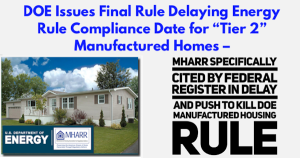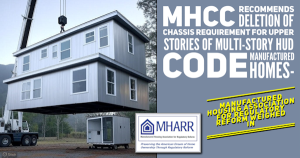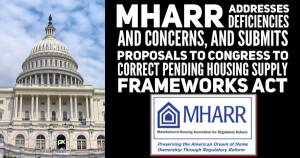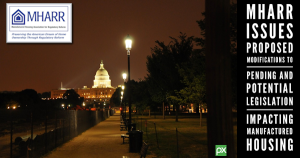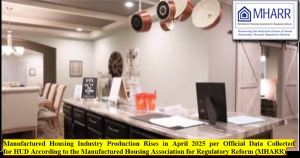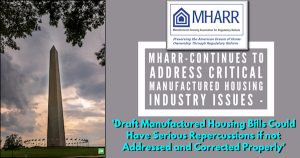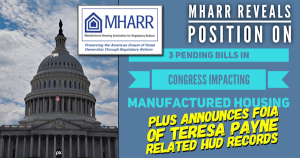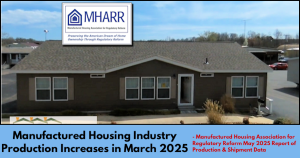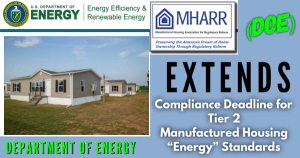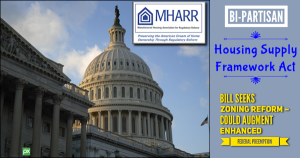Manufactured Housing Association for Regulatory Reform Tightens the Screws on Ginnie Mae’s “10-10” FHA Title 1 Policy
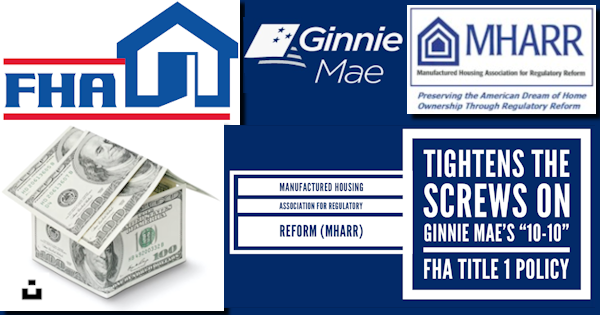
Washington, D.C., September 22, 2022 – The Manufactured Housing Association for Regulatory Reform (MHARR) in written comments filed on September 21, 2022, has once again called on the Government National Mortgage Association (Ginnie Mae) to withdraw and “substantially modify” the “10-10” “approved issuer” qualification policy that has decimated the Federal Housing Administration’s (FHA) Title I manufactured housing program for more than a decade.
Under the “10-10” qualification policy, adopted by Ginnie Mae in 2010, approved issuers within the Title I program for personal property or “chattel” loans to purchase manufactured homes regulated by the U.S. Department of Housing and Urban Development (HUD), must have a net worth of at least $10 million and maintain additional high-dollar reserves based on the volume of Title I consumer loans they originate. By contrast, approved issuers of Ginnie Mae-backed site-built housing consumer loans are subject to a significantly-lower net worth benchmark of $2.5 million, even though site-built housing loans are much larger than manufactured housing loans.
Since 2010, the discriminatory “10-10” policy — by excluding large numbers of manufactured housing lenders from FHA qualification and participation — has virtually destroyed the Title I program. Thus, as Ginnie Mae’s own data demonstrates, the Title I program, in 2009, accounted for 2,544 manufactured home loan originations, or more than 5% of the total manufactured housing consumer loan market. By contrast, in 2021, the last year for which such data is available, the entire Title I program saw just 3 total loan originations, accounting for .002% of the market. The virtual absence of Title I lending support, moreover, has resulted in a less competitive consumer financing marketplace for manufactured home consumer loans, characterized by needlessly high interest rates and the discriminatory exclusion of lower-income Americans and minority groups from the affordable manufactured housing market, contrary to law and the equity policies of the Biden Administration.
MHARR’s comments accordingly, call on Ginnie Mae, once again, to withdraw the 10-10 policy — which is not statutorily-mandated and was never adopted as a formal regulation – and adopt a modified Title I qualification policy that is both non-discriminatory and consistent with the inherent affordability of manufactured housing.
In Washington, D.C., MHARR President and CEO, Mark Weiss, stated: “The 10-10 policy was a bad idea when it was adopted, and has only gotten worse with time. A policy that essentially wipes-out the very program that it supposedly is designed to protect and preserve is, by definition, neither good nor smart. That policy, accordingly, should be reconsidered and substantially modified in order to promote greater lender participation and to revitalize the Title I program as a significant resource for purchasers of affordable manufactured housing.” Weiss continued: “Incidentally, this is yet another example of a beneficial federal housing program, as detailed in an MHARR White Paper published in July 2022, that is failing to reach American consumers and deliver actual benefits on the ground due to baseless policy roadblocks.”
The Manufactured Housing Association for Regulatory Reform is a Washington, D.C.-based national trade association representing the views and interests of independent producers of federally-regulated manufactured housing.

Washington, D.C., September 22, 2022 – The Manufactured Housing Association for Regulatory Reform (MHARR) in written comments filed on September 21, 2022, has once again called on the Government National Mortgage Association (Ginnie Mae) to withdraw and “substantially modify” the “10-10” “approved issuer” qualification policy that has decimated the Federal Housing Administration’s (FHA) Title I manufactured housing program for more than a decade.
Under the “10-10” qualification policy, adopted by Ginnie Mae in 2010, approved issuers within the Title I program for personal property or “chattel” loans to purchase manufactured homes regulated by the U.S. Department of Housing and Urban Development (HUD), must have a net worth of at least $10 million and maintain additional high-dollar reserves based on the volume of Title I consumer loans they originate. By contrast, approved issuers of Ginnie Mae-backed site-built housing consumer loans are subject to a significantly-lower net worth benchmark of $2.5 million, even though site-built housing loans are much larger than manufactured housing loans.
Since 2010, the discriminatory “10-10” policy — by excluding large numbers of manufactured housing lenders from FHA qualification and participation — has virtually destroyed the Title I program. Thus, as Ginnie Mae’s own data demonstrates, the Title I program, in 2009, accounted for 2,544 manufactured home loan originations, or more than 5% of the total manufactured housing consumer loan market. By contrast, in 2021, the last year for which such data is available, the entire Title I program saw just 3 total loan originations, accounting for .002% of the market. The virtual absence of Title I lending support, moreover, has resulted in a less competitive consumer financing marketplace for manufactured home consumer loans, characterized by needlessly high interest rates and the discriminatory exclusion of lower-income Americans and minority groups from the affordable manufactured housing market, contrary to law and the equity policies of the Biden Administration.
MHARR’s comments accordingly, call on Ginnie Mae, once again, to withdraw the 10-10 policy — which is not statutorily-mandated and was never adopted as a formal regulation – and adopt a modified Title I qualification policy that is both non-discriminatory and consistent with the inherent affordability of manufactured housing.
In Washington, D.C., MHARR President and CEO, Mark Weiss, stated: “The 10-10 policy was a bad idea when it was adopted, and has only gotten worse with time. A policy that essentially wipes-out the very program that it supposedly is designed to protect and preserve is, by definition, neither good nor smart. That policy, accordingly, should be reconsidered and substantially modified in order to promote greater lender participation and to revitalize the Title I program as a significant resource for purchasers of affordable manufactured housing.” Weiss continued: “Incidentally, this is yet another example of a beneficial federal housing program, as detailed in an MHARR White Paper published in July 2022, that is failing to reach American consumers and deliver actual benefits on the ground due to baseless policy roadblocks.”
The Manufactured Housing Association for Regulatory Reform is a Washington, D.C.-based national trade association representing the views and interests of independent producers of federally-regulated manufactured housing.



